La Santa Cruz del Pedregal es una de las iglesias modernistas del siglo XX más dinámicas que se pueden ver en el horizonte de la Ciudad de México. Dirigida por los Misioneros del Espíritu Santo, la organización desempeña un papel activo en la vida de la comunidad y de los jóvenes de Jardines de Pedregal.
Los Misioneros surgieron en los años posteriores a la Revolución Mexicana. Muchos católicos del país sintieron la necesidad de vencer algunas de las restricciones que más tarde estallarían en las Guerras Cristeras de los años treinta.
En 1914, en la Capilla de las Rosas del Tepeyac, en Ciudad de México, se fundaron oficialmente los Misioneros, literalmente con la Revolución librándose a su alrededor.
Los dos fundadores del grupo de la ciudad son, en primer lugar, una mujer: Concepción Cabrera de Armida (Conchita). Nació en San Luis Potosí en 1862 y fue madre de nueve hijos. Los grupos citan sus “sorprendentes niveles de experiencia mística”. Escribió 66 libros y miles de cartas, que suman unas 65,000 páginas escritas. Se le atribuye haber inspirado la fundación. Murió en 1937.
El otro fundador fue un sacerdote marista de origen francés llamado Félix de Jesús Rougier. Tras trabajar en Barcelona, fue destinado a Colombia, donde permaneció seis años. La guerra civil le llevó a México en 1902, y conoció a Conchita en 1903. Diez años de trabajo le llevarían a fundar la organización que hoy sigue en el Pedregal.
Además de la Iglesia de Santa Cruz del Pedregal, los Misioneros también tienen iglesias en otras cinco ciudades mexicanas, además de la iglesia de San José del Altillo en Coyoacán. Lo más famoso es que también dirigen el Templo de San Felipe de Jesús, de curioso estilo gótico francés, que puedes visitar en la Avenida Madero del Centro Histórico.
El edificio fue diseñado originalmente por el maestro arquitecto y teórico José Villagrán García. Sus bocetos iniciales datan de 1956. Había planeado un atrio peatonal en la esquina. Con el tiempo se convirtió en un estacionamient0. El arquitecto Antonio Attolini retomó el proyecto en 1966 y se encontró con la estructura metálica de la cubierta ya colocada, por lo que no la modificó en profundidad, en cambio sí añadió color a las paredes y añadió los vitrales interiores. También acercó el altar a los feligreses.
 mspspedr@prodigy.net.mx
mspspedr@prodigy.net.mx
 +52 (55) 5652 6399
+52 (55) 5652 6399
 https://mspsprovinciamexico.org/parroquia-de-la-santa-cruz-del-pedregal/
https://mspsprovinciamexico.org/parroquia-de-la-santa-cruz-del-pedregal/

Cercano a 0.81 kms.

Cercano a 1.25 kms.

Cercano a 1.39 kms.
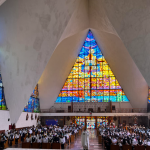
The most spectacular modernist church in the Jardín Balbuena
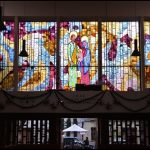
La construcción se inauguró en enero de 1967 y se ha convertido en un centro de oración para los vecinos de la zona.
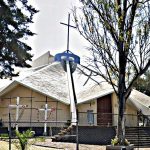
A circular modernist church on the heights over Álvaro Obregón . . .
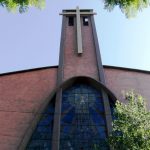
A modernist church in a giant 20th century neighborhood . . .
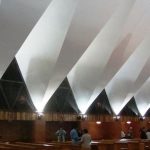
A modernist triumph and neighborhood church in Espartaco, Coyoacán . . .